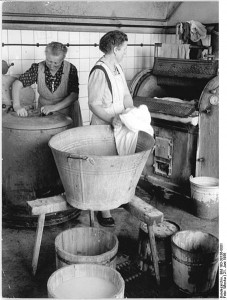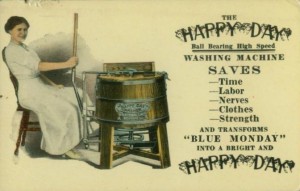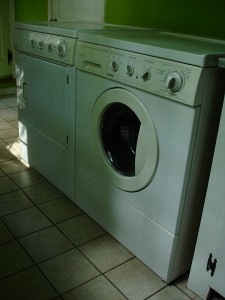Throughout history, there has been laundry. As proof I submit today’s featured image of women in ancient Greece filling a wash tub.
And, as long as there has been laundry, people — usually women — have complained about having to do it. But the truth is, washing clothes today isn’t nearly the chore that it used to be.
In bygone days of yore, laundering by hand was a lengthy back-breaking job that involved soaking garments in hot water heated by a fire underneath a cauldron. This required gathering wood and hauling water before the job could begin. After the first soak, the clothes were beaten and scrubbed before being rinsed. To conserve resources the least soiled were washed first so the water could be reused.

After rinsing, the clothes were twisted by hand to extract water, then hung somewhere to dry. In summer, a clothesline could be used. In winter wet clothes were more likely to be hung near a fire. Nothing like the fresh smell of slightly burned fabrics. As illustrated above, the same basic method was still in use in the early twentieth century. But, a new day was dawning.

Electric washing machines became available for the handful of people who had electricity. As stated in the above postcard advert for the Happy Day Washing Machine, the new modern washing machine saved women time, labor, nerves, clothes, and strength. Thus transforming Blue Mondays in to Happy Days. This, of course, brought up the obvious question of what women would do with their newfound free time?

The washing machine as we know it didn’t come into common use until after World War II. But suddenly there were new concerns about laundry. Stains became the new enemy – whether they be grass, blood, wine, or the dreaded “ring around the collar” featured in a long ago ad campaign for Wisk detergent. If you’d like to see one of the ads, click here.
As Jerry Seinfeld commented,
“Now they show you how detergents take out blood stains, a pretty violent image there. I think when you’ve got a T-shirt with a bloodstain all over it, maybe laundry isn’t your biggest problem. Maybe you should get rid of the body before yo do the wash.”
Great, yet another laundry day chore.
There are tips to make laundry a less daunting job. Here are a few of my favorites.
1. Don’t come home and throw your clothes in the laundry hamper. In researching this blog, I discovered many people don’t bother to wash their jeans at all. They put them in the freezer to freshen them up.
2. Don’t let stains set into the fabric. Treat them immediately. If you’re on a hot date and spill ketchup down your shirt, simply excuse yourself. Go to the rest room and wash your shirt in the sink. Wring it out, Put it back on and saunter back to the table as if you’re 007. Such a quick response proves you’re a person of action.
3. Stop accusing your innocent clothes dryer of eating your socks, and declare a sock bankruptcy. Buy a dozen pairs of identical socks. You’ll never be left without a match.
My point is, while your wash goes through the spin cycle, say a silent thank you to the nameless person who invented the first electric washing machine.
Acknowledgements:
Featured Image: Greek vase. 450-480 BCE. The Louvre, Public Domain. Wikimedia Commons
Whitson Gordon. “Ten Ways to Breeze Through Laundry Like a Boss.” March 30, 2013. Here.

Sandra Wagner-Wright holds the doctoral degree in history and taught women’s and global history at the University of Hawai`i. Sandra travels for her research, most recently to Salem, Massachusetts, the setting of her new Salem Stories series. She also enjoys traveling for new experiences. Recent trips include Antarctica and a river cruise on the Rhine from Amsterdam to Basel.
Sandra particularly likes writing about strong women who make a difference. She lives in Hilo, Hawai`i with her family and writes a blog relating to history, travel, and the idiosyncrasies of life.


Hi Sandra,
You are as interesting and provocative as ever!
For a complementary view with some neat video (esp. by Hans Rosling, a world health expert) see:
http://www.forbes.com/sites/timworstall/2013/12/02/hans-rosling-and-ha-joon-chang-agree-the-washing-machine-is-a-more-important-invention-than-the-internet/
Also: really worthwhile (and short), Rosling’s: “200 Countries, 200 Years in 4 Minutes”https://www.youtube.com/watch?v=jbkSRLYSojo
Best,
David
wonderful article – I have my paternal grandmother’s diaries in which she makes comments about doing the laundry – making soap, heating the water in a tub on the stove, hauling the water outside etc. Her five oldest children were boys so they were enlisted in the laundry effort. When the girls were old enough they had to help as well.
I am sure it was well after the invention of the first electric washing machines that it became a habit to change clothes and bedding much more often.
As for the Jeans and the freezer – new one for me – usually I do not have enough room in the freezer for my jeans so I think I will wash them on occasion.
David — Thank you for sharing the information about Hans Rosling’s work. It isn’t just the washing machine. It’s the time we have for other activities when we’re not chopping wood, hauling water, and doing laundry by hand. The things we take for granted are often the ones most important to our lives. Thanks for commenting.
Mary — Your comment points out how very recent (in historical terms) the washing machine and other labor saving machinery is. And also how suddenly and perhaps unnecessarily they raised the cleanliness bar. Thanks for sharing!